Photographs: Ajay Verma/Reuters Dilip Kumar Jha in Mumbai
The prices of agricultural commodities have jumped sharply in the past month, amid expectations of their output being hit this kharif season because of deficient monsoon rainfall.
The India Meteorological Department has reported 30 per cent rain deficit so far this season.
The benchmark Dhaanya Index, as a consequence, is up 10.3 per cent in the past month, from 2,348.47 on June 9 to 2,590.91 on July 9.
. . .
Poor rain: Inflation haunts agriculture
Image: Farmers harvest rice.Photographs: Darren Whiteside/Reuters
Compiled and maintained by the National Commodity & Derivatives Exchange, this index is an indicator of the movement in major agri commodities, with higher weightage of refined soya oil (28 per cent), rapeseed (25 per cent) and chana (20 per cent).
"June rainfall numbers pose a risk.
"But, it is too early to press a panic button for its impact on overall agri output during this kharif," said D K Joshi, economist (agri commodities), with leading rating agency CRISIL.
A report by NCDEX says India received cumulative rainfall of 137.8 mm against a normal of 197.7 mm.
. . .
Poor rain: Inflation haunts agriculture
Photographs: Joe Skipper/Reuters
At the same time last year, there was a surplus of one per cent over the normal.
Several agri commodities, such as paddy (unmilled rice), oilseeds like soybean, groundnut, etc., cotton and a host of other commodities, including guar seed, are sown with the onset of monsoon.
Delay or deficiency here always hits sowing and the overall yield.
Interestingly, IMD's forecast in May of a normal monsoon impelled a fall in the prices of these commodities, due to excess foodgrain stocks with the government agency, Food Corporation of India.
Prices of turmeric are up 17.85 per cent, of castor seed and cotton seed oilcake by 16.9 per cent and 16.25 per cent, respectively.
. . .
Poor rain: Inflation haunts agriculture
Photographs: Reuters
Chana prices for near-month delivery on the NCDEX jumped 8.8 per cent.
The commodity in spot Delhi mandis followed suit and rose 5.4 per cent to settle at Rs 4,490 a quintal today.
A report by the broking firm Kotak Commodity Services Ltd, said, "Chana was expected to remain firm on low domestic inventories and low production prospects for the season. On the demand side, the seasonal festive demand for Ganesh Chaturthi and Raksha Bandhan is expected to gain pace and support the prices. In addition to these, delay in monsoon progress is affecting the pulses sowing."
Madan Sabnavis, chief economist at Care Ratings, said: "On account of the delayed monsoon and rather erratic progress, there could be two fallouts.
. . .
Poor rain: Inflation haunts agriculture
Photographs: Reuters
"First, delayed sowing in central India, northern states and western India (Rajasthan and MP),which may affect crops such as pulses, oilseeds and cotton.
"Second, substitution of crops that use less moisture with those that need more rainfall. This is serious, as it will distort the crop area, leading to uneven growth in specific farm products.
"Also, normally a delayed onset leads to a protracted withdrawal, which can affect specific crops such as fruits and vegetables towards October.
. . .
Poor rain: Inflation haunts agriculture
Photographs: Reuters
"This can also affect sowing of the rabi crop and has an impact with a lag."
Adding: "Impact of prices will be felt based on actual production numbers.
"The higher minimum support price announced across the board will impact the price level to an extent.
"However, inflationary expectations have started coming in and there could be a tendency for stocks to be released gradually until the harvest on fears of a shortage, which will exert pressure on prices."

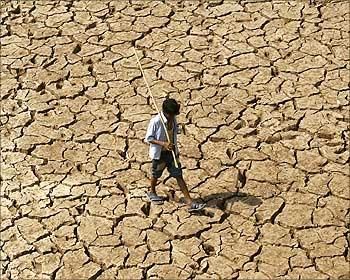
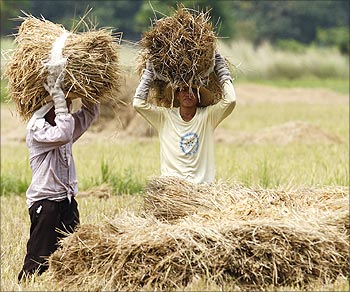
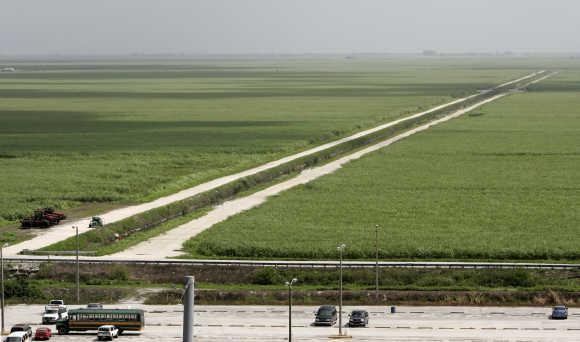
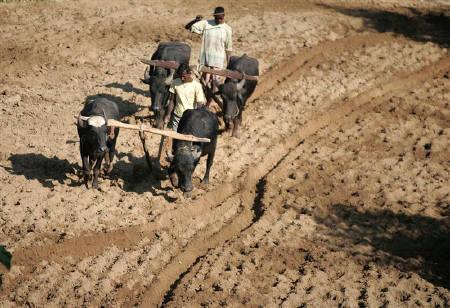
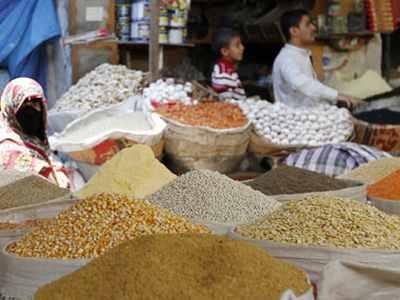
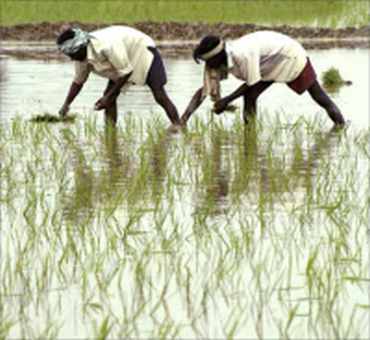

article